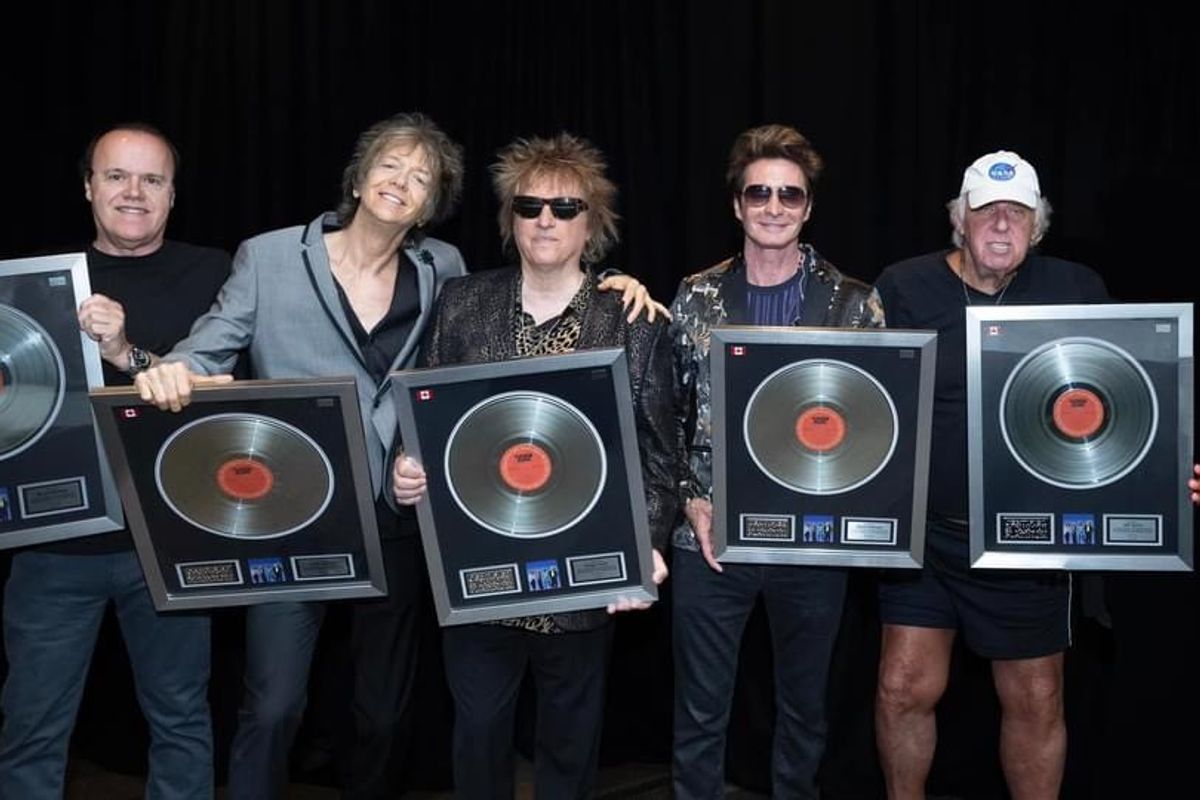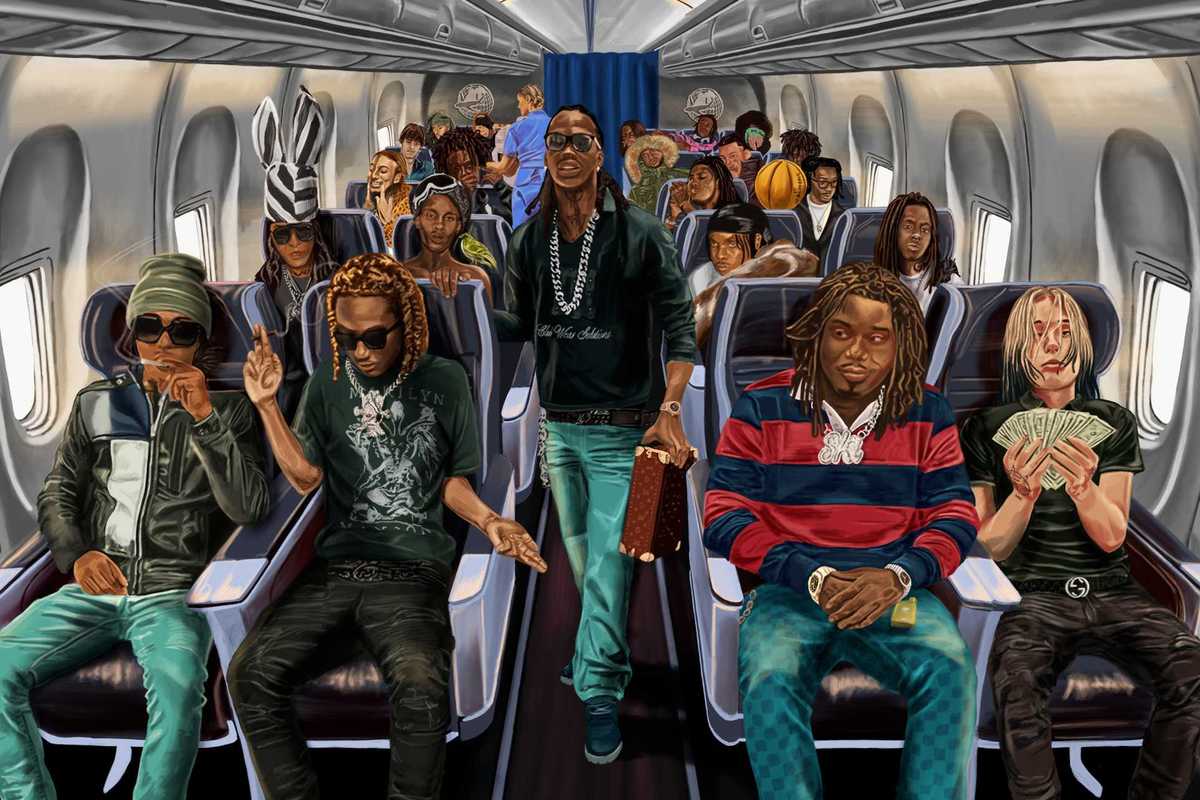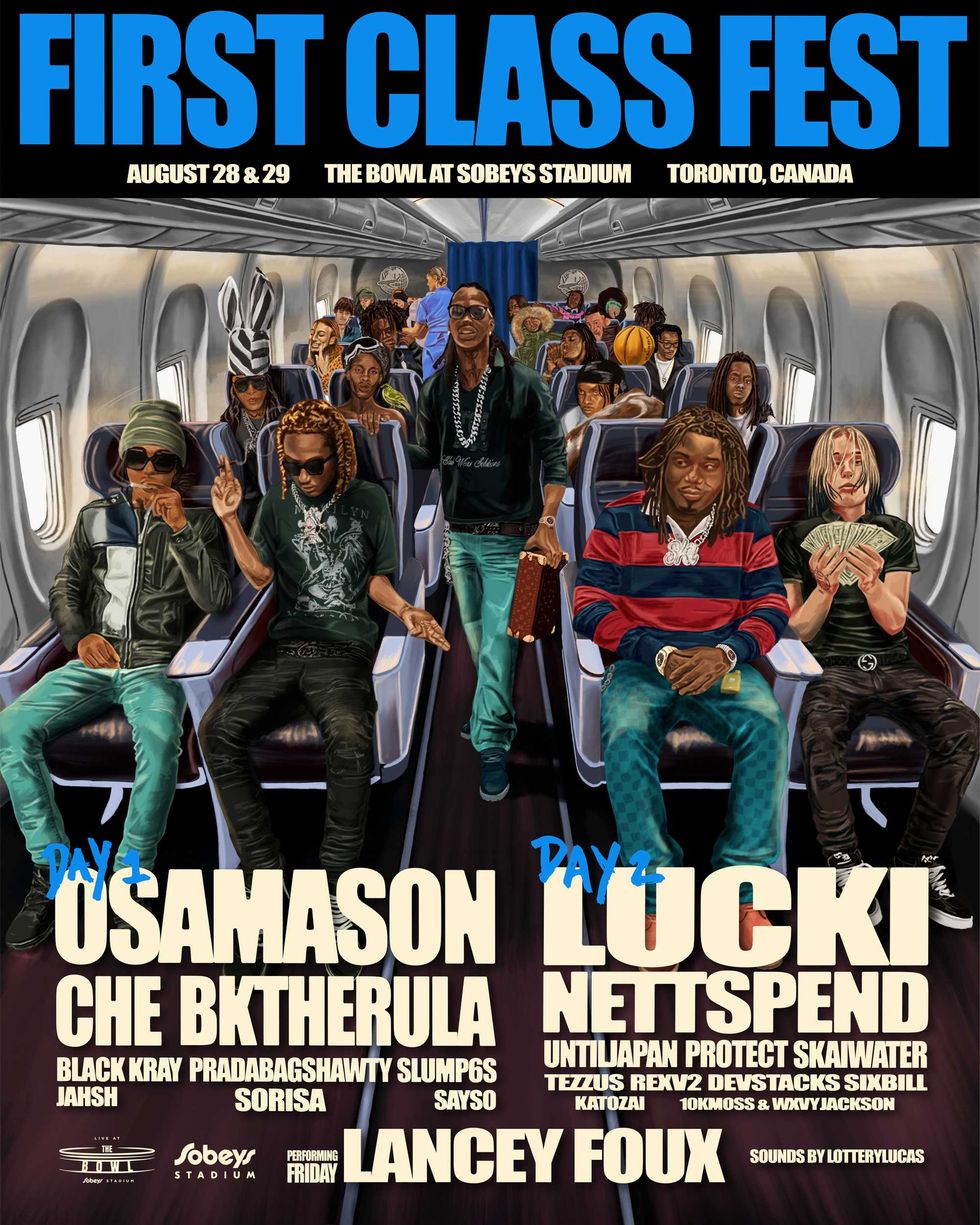Canadian Music Executive Jeff Burns Looks Back on His Global A&R Legacy
He signed Loverboy and Platinum Blonde and was instrumental in the success of top-selling artists like Gowan, Dan Hill, Prism and the early years of Nickelback. With a slate of recent accolades, he reflects on his influential career.

Jeff Burns (right) with the members of Platinum Blonde holding plaques from Music Canada commemorating the multi-platinum success of the album 'Alien Shores.'
Jeff Burns has been experiencing a bit of déjà vu lately – and he likes it.
Burns, who calls Newmarket, Ontario home when he's not wintering as a snowbird in Florida, recently received two mementos that recalled his legacy as a globally impactful A&R executive from 1974 through 1997.
The first was a multi-platinum plaque from Sony Music Canada acknowledging 860,000 units sold for Canadian glam rock band's Platinum Blonde’s Alien Shores. The second was a plaque from the rock band Loverboy commemorating 16 million albums sold worldwide.
Both hit acts were signed by Burns during his tenure at CBS Records Canada (later Sony) as Vice President of A&R from 1979 through 1989. But they represent only a part of a legacy that qualifies him as one of the domestic Canadian music industry’s most successful A&R executives.
Even 45 years after he entered the game, Jeff Burns remains modest about his accomplishments.
"It was really rewarding to see these acts develop," Burns said. "We enjoyed one success after another and I had never experienced that before. I'm really grateful for what happened in Canada and I'll never forget that."
The acts he signed while he was employed at GRT (General Recorded Tape) Canada Ltd, CBS Records Canada Ltd, his own Justin Entertainment Inc. (later Burns Entertainment Inc.) and Shoreline Records Inc. labels don't quite tell the entire story of his life as an influential career catalyst.
Many artists and members of the bands he signed – like Prism, Gowan, Dan Hill and Nickelback – continued to climb the ladder of success following his artistic mentorship.
For example, when Burns signed Prism at GRT, the band boasted a lineup filled with future hitmakers. That included future producer Bruce Fairbairn (Bon Jovi, Aerosmith, AC/DC, Van Halen, Loverboy); Jim Vallance (under the pseudonym Rodney Higgs), a producer and songwriter best known for his work with Bryan Adams and Glass Tiger; eventual Powder Blues founder and singer Tom Lavin; and Ab Bryant, who played bass with Chilliwack and Headpins.
That combo alone has factored in estimated sales of 500 million units that have been blessed by the golden auricles of Jeff Burns at some point in their careers. Judging by combined research involving the RIAA and Music Canada certification sites, 132.5 million have involved Fairbairn's hand in the studio. A high percentage of the 75-to-100 million sales of singles and albums are registered to Jim Vallance as Bryan Adams' songwriting partner for the majority of the artist's chart runs.
Between his work with Backstreet Boys, 98 Degrees, Britney Spears and Céline Dion, there are also about 200 million in combined unit sales that Dan Hill has been involved with as a tunesmith and producer. That's not to mention his own smash hits "Sometimes When We Touch" and later, through Sony, "Can't We Try," his Top 10 duet with Vonda Shepard.
It's a pretty good track record to say the least – and that's excluding a multi-platinum-and-gold CBS/Sony run that also includes Gowan, hard rockers Kick Axe, Queen City Kids, Orphan, Ian Tyson (for the albums Old Corrals and Sagebrush and Ian Tyson) Matt Minglewood, Mae Moore and Barney Bentall, as well as an indie run that included future superstars Nickelback.
"I don't know anyone who has better ears," says Dan Hill, a Grammy and five-time Juno Award winner who has been professionally linked with Burns for 51 years. "Jeff could hear a hit."
Burns was only involved from a licensing standpoint with the first Nickelback album, Curb, for the briefest of time periods during his independent Shoreline Records days, but his preliminary efforts to showcase them in New York was a step in the process that eventually enabled the Hanna, Alberta band to surpass album sales of 50 million units.
Paul Farberman, who held the position of Vice-President, Business Affairs at CBS Records during Burns' A&R tenure at the label, calls him a lifetime advocate of his artists.
"He has a passion for music," says Farberman over the phone from L.A. "He really loves music and he loves the artists. He wanted to see them succeed, not for his own glory or his pocketbook; he really believed in the artists he signed. He definitely believed they should get the acclaim and attention and the sales that would come along with it."
Farberman marvels that Burns is still friends with most of his signings today.
In the case of Loverboy, Burns successfully pulled off a rarity: convincing the U.S. parent label to support a Canadian signing. Loverboy achieved RIAA-certified U.S. multi-platinum sales for 1980's Loverboy (2 million, 500,000 in Canada); 1981's Get Lucky (4 million, 300,000 in Canada); 1983's Keep It Up (2 million, 200,000 in Canada) and 1985's Lovin' Every Minute Of It (2 million, 100,000 in Canada).
"We had to move mountains to get these people involved," Burns remembers. "But once they did – it was Mickey Eichner, head of A&R at Columbia, I think when 'The Kid Is Hot Tonite' came out – things got totally turned around."
The Toronto-born Burns' story begins on guitar – which, he admits, was a short-term dream – before he entered the record retail world as a teen in 1968 working at The Record Treasury near Yorkville before it was absorbed by A&A Records, where he worked his way up to the position of Assistant Manager.
After spending a year with A&A in Montreal, he was hired by Scott Richards at MCA Records Canada as Ontario promo rep – a rank he held for 18 months until GRT President Ross Reynolds recruited him in 1974 as National Promotion/A&R Manager.
"Neill Dixon was leaving his national promotion/A&R Manager job," Burns explains. "Of course, I grabbed it. I was already listening to a lot of demos submitted by artists when I was working retail."
When Burns arrived at GRT, the label boasted Moe Koffman, Lighthouse, Ian Thomas, Downchild Blues Band, Dr. Music and James Leroy.
"Ross gave me a free hand to do a lot of traveling and I spent a lot of time during those years in Vancouver. I just really liked it out there."
Burns forged a close relationship with manager Bruce Allen and signed Prism.
"Prism are two million and counting in cumulative sales right now," says Burns. "I got very close with Rocket Norton, who passed away from cancer last year."
For his second signing, Burns had to convince Reynolds to reverse a previous decision and sign Dan Hill. Burns recalled that Hill "didn't have a lot of money at that point."
"He was very poor. He had ripped jeans. But he had great songs and the great songs got better and better."
The label did well enough with the Hill hit "You Make Me Want To Be" and initially a gold album, and its follow-up “Hold On,” but the master stroke was pairing him with songwriter Barry Mann for the Longer Fuse album's eventual romantic evergreen "Sometimes When We Touch," which remains Hill's most covered copyright and the only song to earn repeat Juno Award nominations in 1978 and 1979 for Best Selling Single.
Another GRT signing included Shooter – formerly the Greaseball Boogie Band – and while he didn't directly ink them, other Canadian acts under his purview as a promo man were FM (via GRT-distributed Passport Records), Klaatu and Crowbar (Daffodil Records), as well as the distributed labels ABC-Dunhill (Steely Dan, Steppenwolf, Three Dog Night), 20th Century Fox (Barry White) and Sire (Renaissance).
After WEA Music Canada Ltd. nabbed GRT prez Reynolds for its Executive Vice President position, Burns' days at the company were numbered.
"GRT's U.S. counterpart was not doing well," Burns reveals. "So, I tried to buy it with a couple of guys, but it was too late."
Fate intervened, as Burns got a call from CBS Records Canada president Arnold Gosewich informing him that the label's A&R tandem of Bob Gallo and Don Lorusso were about to depart.
"I was up against Deane Cameron, who was already doing A&R at Capitol, for the job. But [Gosewich] hired me and that's when I really got into it. The '80s were the best years for CBS in terms of developing new artists."
Burns' first CBS signing as Vice-President of A&R was ex-Rhinegold founder Lawrence Gowan, who under the name Gowan released a self-titled album in 1982 that, frankly, tanked. But Burns continued to believe in the young singer and songwriter's potential and was validated with the release of Strange Animal in 1985 and particularly the single "A Criminal Mind," which was supported by an animated video directed by Rob Quartly.
The album sold over 500,000 copies and established a Canadian multi-platinum career with albums Great Dirty World and Lost Brotherhood for Gowan, who has been the lead singer and keyboardist for American rockers Styx since 1999 and averages 100 dates a year.
"His writing was developing and 'A Criminal Mind' just blew everyone away," Burns recalls. Ever-modest, he also gives credit to the marketing, promotion, radio and sales departments at CBS, including Don Oates, Kim Zayac, Graham Powers, Art Graham and Brad Weir.
His next signing? Loverboy, featuring singer Mike Reno, guitarist Paul Dean, keyboardist Doug Johnson, bassist Scott Smith and drummer Matt Frenette, managed by Burns' pal Bruce Allen. Another CBS signing was Dan Hill, and Hill said he is forever grateful for Burns' backing.
"He's given me amazing support, right from the very beginning," says Hill. "My first success was those four albums I banged out in the '70s, so all of them sold massively and none of that would have happened without Jeff.
"Then I kind of had my fall from grace, where I started writing for other artists like George Benson, and then I wanted to make a comeback. Again in 1986, Jeff was the one who got Columbia to sign me because he believed in the song called 'Can't We Try,' which ended up being a massive hit in America. So, all my success through the decades, Jeff has been there right from the very beginning."
There was also Platinum Blonde, which began as a trio with singer, bassist and songwriter Mark Holmes, guitarist Serge Galli and drummer Chris Steffler and later expanded to a quartet with the addition of bass player Kenny MacLean.
Burns licensed and released the band's EP – which became the label's biggest-selling extended play – and then went for the full album Standing In The Dark, which has since sold 300,000 copies in Canada.
But the big shock occurred nearly four decades after the release of Alien Shores, the first album to include MacLean.
During its original release cycle, the album – led by the massive hit "Crying Over You" – sold 400,000 copies.
Earlier this year, Burns and the Blondes checked on the updated sales stature of Alien Shores with Chris Shepherd, Sony Music Canada's Manager, Commercial Products.
"We called Chris and we were expecting the updated number to be 500,000," Burns recalls. "And he said, 'no, you're at 860,000!’ I mean, this is an album that's 40 years old!"
With expectations of a 2025 Platinum Blonde summer tour in mind, Burns feels that a sales pinnacle is within the band's grasp.
"They're trying to get to one million and I think they will," he states.
Burns' A&R run at Sony was formidable, but four record company presidents later, it was over.
"The '80s were great," he says. "Just about every release we put out, clicked.”
They weren't all winners. Some later signings didn't make as much of an impact on the sales side. "You can get a lot of artists that do well and get a lot of recognition, but don't sell. But you sign them to pay the bills, and that's what you're weighed on in terms of your successes."
And there were the ones that got away. Burns said he tried to sign Sheriff, the band that released the ballad "When I'm With You" in 1982, broke up in 1985 and posthumously topped the Billboard charts in 1989 with that song.
In January 1990, Burns founded the indie label Justin Entertainment, releasing works by Mary Lu Zahalan, Goddo, Joel Feeney, Laura Mattson, Manteye, Kenny MacLean and Platinum Blonde (who had shortened their name to The Blondes by this point), as well as some international acts.
"My time had come and I had a chance to start an independent label, which was totally the wrong year to do so," Burns commiserates. "The interest rates rose and the economy fell."
He was also banking on better results from the Blondes' album Yeah Yeah Yeah.
"We lost out when they changed their name. The interest in them started to wane. I thought that we would be good for sales of 35,000-40,000 copies based on their past performance. Kenny MacLean was actually outselling them with his solo record – and then he died. I went through a lot of money very quickly."
Burns founded Shoreline Records in 1996 and for the next two years released albums by Patricia Conroy, The Killjoys, Rymes With Orange, Thomas Wade, a Christmas album by vocal greats The Nylons and an auspicious debut from a band out west called Nickelback.
He stumbled upon them by accident after rifling through some albums being printed at Music Manufacturing Services, former Attic Records executive Lindsay Gillespie's Toronto-based media manufacturing business.
"I would always be looking for finished product that didn't have a label affiliation, and that was the situation with the Nickelback record, Curb," Burns explains. "I reached out to their Vancouver lawyer Jonathan Simkin and I licensed the record."
Distributed by Koch, Nickelback's Shoreline days started off promisingly, but Burns lost his option on their second record, The State. They signed to Roadrunner in the U.S. and Capitol in Canada and he watched from afar as they blew up into one of the country's most successful rock bands.
Burns says his formula for spotting a success story was simple.
"I was always looking for a singer-songwriter-performer," says Burns. "If you didn't have all three, I may not have been all that interested."
Looking back, it seems to have worked.


















